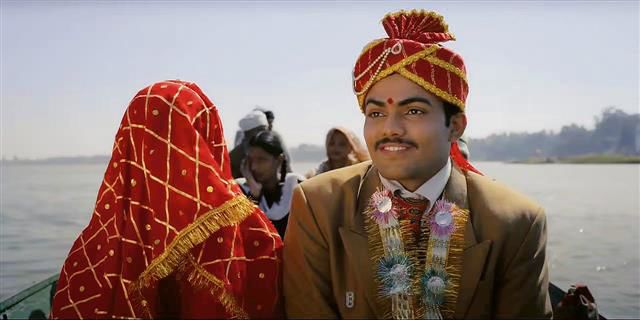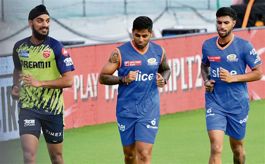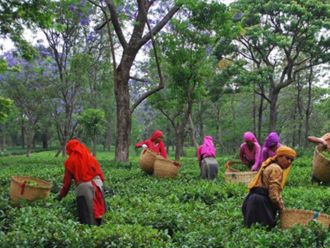‘Laapataa Ladies’ busts many patriarchal ideas without being screechy or overtly belligerent about what it wants to convey.
Film: Laapataa Ladies
Director: Kiran Rao
Cast: Nitanshi Goel, Sparsh Shrivastava, Pratibha Ranta, Ravi Kishan, Geeta Aggarwal and Chhaya Kadam
Nonika Singh
What happens when two young brides get mixed up and land up where they are not meant to be? Well, a pleasurable tale begins to acquire flesh, blood and a beating heart. Kiran Rao’s second directorial venture, ‘Laapataa Ladies’, busts many patriarchal ideas without being screechy or overtly belligerent about what it wants to convey. Though the credits express gratitude to Madhya Pradesh, the setting is a fictional Nirmal Pradesh. And gentle it is.
Like the song ‘Dheeme Dheeme Chale Purvaiya’, with music by Ram Sampath and lyrics by Swanand Kirkire, the touch is light and as light-hearted as the basic premise. The fate of two newly-wedded rural women on way for a train journey to their sasurals, all thanks to their long ghoonghats, is intertwined. Instead of reaching their individual marital homes, Jaya finds herself in Phool’s house and Phool has to seek refuge among a few good people at a railway station.
Thus begins the drama with some essential lessons on naari shakti before we move towards an ‘all is well that ends well’ climax. How often do you see a film that wears the message on its sleeve and yet tickles your funny bone, is as delightful as meaningful? Joyous and touching, short (nearly two hours) and sweet, this socially-relevant comedy set in 2001 entertains in the most simple and organic fashion without becoming simplistic. Or preachy!
Yes, certain scenes like the ones where the daughter-in-law talks about why women can’t band together as friends and asks her mother-in-law if they can strike a friendship, do seem a tad superimposed. Still, nothing stands out like a sore thumb. Even gifted actor Ravi Kishan’s corrupt cop Manohar’s change of heart does not seem contrived. After all, the bribe-seeking Inspector does believe in evidence and not taking the law into his hands. If veteran actors like Kishan, who is exemplary as the ‘good-bad’ policeman, and Geet Aggarwal (Deepak’s mother) get into the skin of their parts, the younger cast is as credible. Nitanshi Goel as Phool is incredibly refreshing and there isn’t a fake note to her innocence and coy expressions. Her lovelorn husband Deepak, played by Sparsh Shrivastava, is equally beguiling, especially in the romantic interlude between them where he tries to impress Phool with his English expression of love.
In the character arc of Jaya (resolute and impressive Pratibha Ranta) lies the real crux of the film. Though suspicion and a fair degree of mirth are built around her inexplicable ways, we know she is the pillar on which the feminist narrative rests.
With the original story by Biplab Goswami, writing is sharp. Direct yet subtle in many ways, it creates a fine parallel between the tales of Phool and Jaya, one diffident and innocent, the other confident and aware. Their situations or dilemmas are not identical but are still interlinked and so is their need for self-worth. Phool discovers it in the unlikeliest of places, among the most unexpected feminist. Manju Maai (Chhaya Kadam), who runs a samosa and chai shop at the railway platform, is quite a radical. She observes that the so-called ‘respectable conduct’ diktat imposed on women is the biggest fraud ever.
Dialogues by Divyanidhi Sharma and Sneha Desai are amusing and pertinent. One line, ‘Face is the real identity of a person’, says and uncovers more than any monologue (on ghoonghat pratha) would/could have. Only, before you can nod along with the man who utters the socially-correct dialogue, his wife, clad in a burqa, pops up. If you can’t suppress the chuckle at the sight of her, you also can’t help but admire Kiran Rao for packing so much pithiness in one dialogue and one scene. And it are these fleeting touches that lift the film and prevent it from becoming heavy or instructive.
The title itself is a pointer. An indicator of more than one thing in a country where women’s dreams and desires often go missing, it also signals how sometimes they have to lose themselves to find their real identity — laapataa for the right pata (address). The Aamir Khan production drives home the message with conviction and humour.














